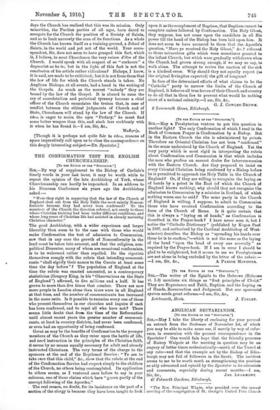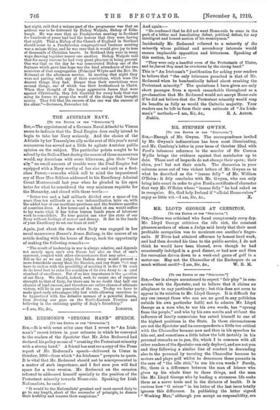ANGLICAN SECTARIANISM.
[To THE Emma or rue "Spam/Tom:1 Sin,—May I take the liberty of enclosing for your perusal an extract from the Scotsman of November 1st, of which you may be able to make some use, if merely by way of refer- ence, in connexion with the present correspondence in the Spectator? One would fain hope that the friendly presence of Bishop Walpole at the meeting in question may be an augury of better times ecclesiastically—north of the Tweed at any rate—and that the example set by the Bishop of Edin- burgh may not fail of followers in the South. The incident seems to me to be worth much as strengthening the position so ably advocated and upheld by the Spectator in its editorials and comments, especially during recent months.—I am, Sir, &o, JAS. LEARMONT. 47 Polwarth Gardens, Edinburgh.
"The Rev. Principal Whyte, who presided over the annual meeting of tile congregation of St. George's United Free Church
last night, said that a unique part of the programme was that an address was to be delivered by Bishop Walpole, Bishop of Edin- burgh. He was sure that no Presbyterian meeting in Scotland for hundreds of years had had the honour that they were having that night. That a Bishop of the Church of England in Scotland should come to a Presbyterian congregational business meeting was a unique thing, and he was sure that it would give joy to tens of thousands of Christian hearts. In Scotland they were in many ways drawing together nearer one another. Bishop Walpole said that for many reasons he had very great pleasure in being present. One was that on the day he was consecrated Bishop one of the features which gave him hope was the kind attendance of the two ministers of that congregation (Principal Whyte and the Rev. Dr. lieimam) at the afternoon service. In meeting that night they were not parting with any of their convictions, which were the dearest things they had. Deeper than their convictions were several things, one of which was their brotherhood in Christ. When they thought of the large aggressive forces that were against Christianity, they felt thankful for every body that was using its forces to purge the world of the things that brought misery. They felt that the success of the one was the success of the other."—Scotsman, November 1st.



































































 Previous page
Previous page